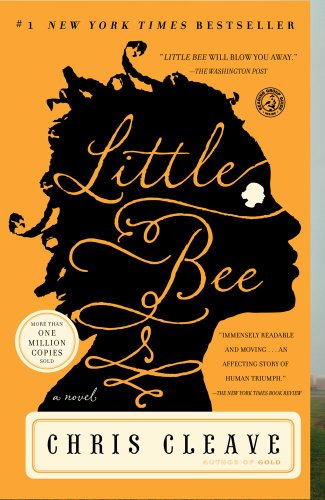Little Bee: A Novel by Chris Cleave
This was my November book club choice. I'd heard some good things about it so I was looking forward to reading this story. I am a bit torn about how I feel about it.
The first half of the book was very engaging, and what a strong first sentence - "Most days I wish I was a British pound coin instead of an African girl." (implying that people are happier to see a coin than an African girl). However, the second half slowed. And I also did not like the ending - not because it was happy or sad, but because it was ambiguous. I just do not like ambiguous endings. I know some readers like that because they can finish the story with their own imagination or have their own desired ending, but I prefer the author to tell me because it is their story, not mine.
The story were told from two perspectives - Little Bee (the African girl), and Sarah who met Little Bee in Nigeria on that fateful day on the beach that changed both of their lives. I liked the Little Bee chapters much more than Sarah's. Someone from the book club asked if the book would have been better if Sarah's chapters were eliminated. Well, her side of the story did provide some background, so I don't know how that'd work. I guess I just did not know how I felt about Sarah - I really admired a couple of actions she took, but at the same time, she seemed rather naive for a 32 years old and she made lots of decisions I disliked also.
I also wondered about Little Bee's language ability - it did not seem like she knew much English beforehand (that was the impression I got anyway, since she lived in a rural little town in Nigeria), and yet she spoke too poetically and with much sophistication from someone who learned most of her English in the detention center watching TV. Though I suppose some people are more gifted with languages than others. (Note, I was not aware that English was Nigeria's official language, though according to wiki, English is more for the urban elite, and not for rural areas.)
The story sometimes was too contrived [Spoilers] - Little Bee's detection "friend" hanged herself, Sarah's husband hanged himself. Little Bee and Sarah's boyfriend Lawrence both mentioned the word "just" and its implication separately, e.g. calling someone "just" a co-worker when it wasn't necessary ("she is a coworker, vs. "she is just a coworker"), as it implied some guilt. The cop got called about Sarah's missing son would also arrest Little Bee, then Little Bee would be back to Nigeria so soon for deportation, even though she was in the detention center for 2 years prior... [/Spoilers]
I am not a writer, but I also thought the author seemed to tell more than show - mostly with Little Bee telling us what hapepend. I think my disappointment also came from the hype - the back of the book said "Once you have read it, you'll want to tell your friends about it. When you do, please don't tell them what happens. The magic is in how they story unfolds." But I didn't really feel the magic. I kept waiting for the magic. The message of the story was an important one (what refugees had to do to survive), and I don't disagree with that, but I thought the execution could have been better. However, it did make me think, if I was in Nigeria on that fateful day, what would I have done? Would I have done what Sarah did? or Andrew? Or something else altogether? I simply do not know. I think it is one of those scenarios that you won't know how you'd react until it happened to you.
One of the most interesting aspects of the book was to read about Little Bee's survival/exit strategy (see 3rd quote below) - what her mind set was even when she was in a seemingly safe place. But the author didn't really have to devote a whole chapter to it as it just got boring after a while - we got the message already. I also liked the author's subtle humor (see 4th quote). As you could see, all the quotes came within the first 50 pages. I really wish the rest of the book was as strong.
Note - there were some brutal, violent moments in the book. So be warmed as I know some readers couldn't stomach graphic descriptions.
We must see all scars as beauty. Okay? This will be our secret. Because take it from me, a scar does not form on the dying. A scar means, I survived. (p9)
In your country, if you are not scared enough already, you can go to watch a horror film. Afterward you can go out of the cinema into the night and for a little while there is horror in everything. Perhaps there are murderers lying in wait for you at home. You think this because there is a light on in your house that you are certain you did not leave on... Horror in your country is something you take a dose of to remind yourself that you are not suffering from it. For me and the girls from my village, horror is a disease and we are sick with it. It is not an illness you can cure yourself of by standing up and letting the big red cinema seat fold itself up behind you. (p45)
In the immigration detention center, they told us we must be disciplined to overcome our fears. This is the discipline I learned: whenever I go into a new place, I work out how I would kill myself there. In case the men came suddenly, I make sure I am ready. The first time I went into Sarah's bathroom I was thinking, Yes Little Bee, in here you would break the mirror of that medicine cabinet and cut your wrists with the splinters. When Sarah took me for a ride in her car I was thinking, Here, Little Bee, you would roll down the window and unbuckle your seat belt and tip yourself out of the window, no fuss, in front of the very next lorry that comes the other way. (p47)
In the canteen there was a television that was always on. I began to learn more about life in your country. I watched programs called Love Island and Hell's Kitchen and Who Wants to Be a Millionaire? and I worked out how I would kill myself on all of those shows. Drowning, knives, and ask the audience. (p49)
3 / 5 .
(The first half would have been at least a 4 / 5, but the 2nd half did not live up to the expectation.)
Note - The book was borrowed from the library.
All reviews and posts are copyrighted by Christa @ Mental Foodie. Please do not use or reprint them without written permission.









This is one of those books that the more I hear about, the less I want to read. And yet, I'm curious too - what is this book all about, and why does it have such a divided reader camp? It reminds me of Bernhard Schlink's The Reader.
ReplyDeleteI haven't read The Reader or watch the movie. I think you'd like this book better than I do since it's a bit more character driven. I think I was also misled by the hype on the back of the book.
DeleteThis is a book which has one of the most gimmicky marketing tactic and fail to deliver. I read it in 2009 and didn't like it at all. Bernhard Schlink's The Reader however was my favourite read.
ReplyDeleteGimmicky marketing was exactly what I said at the book club (and I forgot to say it in my review lol.) I mean, doesn't the whole "When you do, please don't tell them what happens. The magic is in how they story unfolds." apply to all books really (unless the person is one of those who gives out spoilers for everything?!)
DeleteI read this book with my book club and I agree with you completely on the gimmicky marketing strategy. I was not blown away. I did not feel the need to tell my friends. The other members of my group were equally 'meh' about it, although we did end up having a good discussion on class and race and desperation and entitlement.
ReplyDelete